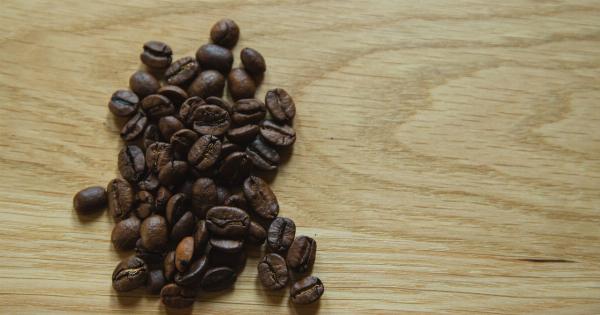Bloating is a very common digestive problem that affects millions of people. It is characterized by a feeling of fullness or tightness in the abdomen, which can be uncomfortable and even painful.
Although there are many factors that can cause bloating, including stress, medications, and medical conditions, the food we eat also plays a significant role.
In this article, we will discuss some healthy foods that can cause bloating and suggest some alternatives that can help you alleviate this uncomfortable symptom.
1. Legumes
Beans, lentils, chickpeas, and other legumes are excellent sources of fiber, protein, and nutrients. However, they are also notorious for causing excessive gas and bloating.
This is because they contain a type of carbohydrate called oligosaccharides, which our bodies cannot fully digest.
To reduce bloating and gas from legumes:.
- Soak them in water for at least 4 hours or overnight before cooking.
- Drain and rinse them thoroughly before cooking.
- Cook them with herbs and spices that can help with digestion, such as cumin, fennel, and ginger.
- Start with small amounts and gradually increase your intake to allow your body to adjust.
- Try incorporating other sources of plant-based protein, such as quinoa, tofu, and tempeh.
2. Cruciferous Vegetables
Cauliflower, broccoli, Brussels sprouts, and other cruciferous vegetables are low in calories and high in fiber, vitamins, and minerals. However, they also contain sulfur compounds that can cause gas and bloating, especially when consumed raw.
To minimize bloating from cruciferous vegetables:.
- Cook them thoroughly by steaming, boiling, or roasting.
- Avoid eating them raw in large amounts.
- Include other low-fiber vegetables, such as cucumber, zucchini, and tomatoes, in your diet.
- Drink plenty of water and stay hydrated to help flush out excess gas and waste.
- If you have a sensitive digestive system, try eliminating cruciferous vegetables from your diet for a few days to see if your symptoms improve.
3. Dairy Products
Milk, cheese, yogurt, and other dairy products are rich in calcium, protein, and vitamins. However, they can also cause bloating, cramps, and diarrhea in people who are lactose intolerant.
Lactose intolerance occurs when the body cannot produce enough of the enzyme lactase, which is necessary to break down lactose, the sugar found in dairy products.
To minimize bloating from dairy products:.
- Switch to lactose-free or low-lactose dairy products, such as hard cheese, yogurt, or lactose-free milk.
- Try non-dairy sources of calcium, such as kale, broccoli, almonds, and fortified plant-based milk.
- If you still want to consume dairy products, try taking a lactase enzyme supplement with your meals.
- Avoid consuming large amounts of dairy products in one sitting and spread your intake throughout the day.
4. Apples
Apples are a rich source of fiber, vitamins, and antioxidants. However, they also contain fructose, a type of sugar that can cause bloating and gas in some people who are sensitive to it.
To minimize bloating from apples:.
- Eat apples in moderation and combine them with other low-fructose fruits, such as berries, citrus fruits, or melons.
- Peel and slice apples before eating them to reduce their fiber content.
- Cook apples by baking, stewing, or roasting them to break down their fructose content.
- Consider using low-fructose sweeteners, such as maple syrup, honey, or coconut sugar, instead of apple juice or dried apples in your recipes.
5. Onions
Onions are a staple in many savory dishes and provide flavor and nutrients. However, they also contain fructans, a type of carbohydrate that can cause bloating, gas, and discomfort.
To minimize bloating from onions:.
- Use raw onions sparingly and cut them into small pieces to reduce their fructan content.
- Cook onions thoroughly by sautéing, caramelizing, or roasting them to break down their fructans.
- Try using other herbs and spices, such as garlic, ginger, or cumin, to flavor your dishes instead of onions.
- Avoid consuming high-fructan foods, such as artichokes, garlic, leeks, and wheat, in large amounts to prevent bloating.
6. Carbonated Drinks
Carbonated drinks, such as soda, sparkling water, and beer, contain carbon dioxide gas, which can build up in your digestive system and cause bloating, burping, and flatulence.
To minimize bloating from carbonated drinks:.
- Avoid consuming large amounts of carbonated drinks in one sitting.
- Switch to non-carbonated drinks, such as water, herbal tea, or fruit juice, to stay hydrated.
- If you still want to drink carbonated drinks, try sipping them slowly and avoid using a straw, which can cause you to swallow more air.
- Consider using a digestive enzyme supplement, such as alpha-galactosidase, to help break down the complex sugars found in carbonated drinks.
7. Wheat
Wheat is a staple in many Western diets and is found in bread, pasta, cereals, and other processed foods.
However, it also contains gluten, a protein that can cause bloating, cramps, and diarrhea in people with celiac disease or non-celiac gluten sensitivity.
To minimize bloating from wheat:.
- Avoid eating foods that contain wheat, such as bread, pasta, cakes, and cookies.
- Switch to gluten-free alternatives, such as quinoa, buckwheat, or brown rice.
- Read food labels carefully and avoid foods that may contain hidden sources of wheat, such as soy sauce, salad dressings, and beer.
- If you suspect that you have celiac disease or gluten sensitivity, consult with a healthcare professional before making any changes to your diet.
8. Fatty Foods
Fatty foods, such as fried foods, fast food, and processed snacks, are high in calories and can cause bloating, especially when consumed in large amounts.
When you eat foods that are high in fat, your body takes longer to digest them, which can lead to a feeling of fullness and discomfort.
In addition, fatty foods can also trigger the release of hormones that stimulate the digestive system and cause gas and bloating.
To minimize bloating from fatty foods:.
- Avoid consuming large amounts of fatty foods in one sitting.
- Choose healthier sources of fat, such as avocados, nuts, seeds, and olive oil.
- Limit your intake of processed snacks, such as chips, cookies, and cakes, which are high in both fat and sugar.
- Bake, grill, or steam your foods instead of frying them to reduce their fat content.
9. Sugar Alcohols
Sugar alcohols, such as sorbitol, xylitol, and erythritol, are commonly used as sweeteners in sugar-free gum, candy, and other processed foods. However, they can also cause bloating, gas, and diarrhea in some people who are sensitive to them.
When you consume sugar alcohols, they are not fully absorbed by your body and can ferment in your colon, causing gas and bloating. In addition, sugar alcohols also have a laxative effect and can cause diarrhea and abdominal cramps.
To minimize bloating from sugar alcohols:.
- Avoid consuming foods that contain high amounts of sugar alcohols, such as sugar-free gum, candy, and mints.
- Choose natural sweeteners, such as honey, maple syrup, or stevia, instead of sugar alcohols.
- If you still want to consume sugar alcohols, do so in moderation and spread your intake throughout the day.
10. Salty Foods
Salty foods, such as chips, pretzels, and processed snacks, are a common source of sodium in many Western diets. However, excessive sodium intake can cause your body to retain water, leading to bloating and swelling.
In addition to bloating, consuming too much sodium can also increase your blood pressure and your risk of heart disease, stroke, and kidney damage.
To minimize bloating from salty foods:.
- Avoid consuming foods that are high in sodium, such as fast food, canned soups, and processed snacks.
- Choose low-sodium alternatives, such as fresh fruits and vegetables, whole grains, and lean protein sources.
- Read food labels carefully and avoid foods that contain more than 400 mg of sodium per serving.
- If you still want to consume salty foods, do so in moderation and drink plenty of water to help flush out excess sodium.
Conclusion
Bloating is a common digestive problem that can be caused by many factors, including stress, medications, and medical conditions. However, the food we eat also plays a significant role.
In this article, we have discussed some healthy foods that can cause bloating and provided some alternatives that can help you alleviate this uncomfortable symptom.
By making some simple adjustments to your diet, you can enjoy the health benefits of these foods without the discomfort of bloating.




























